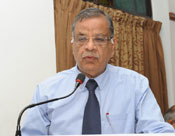
The seventh International Seminar on 'Wheat and Wheat Products New Technologies Marketing Opportunities' will be held in Chennai on September 2 and 3, 2014. Wheat Products Promotion Society is the main organiser of the seminar, together with the Roller Flour Millers' Federation of India, Tamil Nadu Roller Flour Manufacturers' Association (TNRFMA), All India Bread Manufacturers’ Association (AIBMA) and Society of Indian Bakers.
Dr. Indu Sharma, Project Director, Directorate of Wheat Research says 'Wheat is the most important crop in India and a large number of people depend upon wheat system for their livelihood. The condition within India is quite comfortable with a record production of more than 75 million tonnes. However, the price is high in the international market and India has had the lowest stock levels in the global market. The suggestions that emerge from this seminar will be sent to the Government of India to help evolve a long term food policy'
Mr. Ratan Gupta, Chairman, Organizing Committee says 'The International seminar is expected to be a forum to discuss and find solutions for the various challenges faced by the Indian Wheat industry in the global market. Issues of taxes, policy decisions, attitude of the authorities and public distribution system will be addressed at the seminar'.
Mr. N.L. Mehta, Vice Chairman, Organizing Committee says 'WPPS has been organizing a number of seminars for the last many years on relevant themes concerning Wheat Value Chain encompassing from farm to plate. The seminar at Chennai will have four technical sessions — global wheat production, trade and commerce, domestic wheat production, distribution and consumption. It will also have sessions which deal with the future scenario of wheat products and food security and nutrition”.
Wheat system has a number of elements, from science & research, cultivation and all aspects of farm practices, post-harvest movement, storage and trade, processing, production and marketing of food ready-for-consumption. At each sub-system, there are numerous considerations of growth, efficiency, remunerations and incentives to produce, finance and exchange, regulatory regime, social responsibilities, poverty alleviation, health and welfare of our fellow citizens. Each sub-system works within its own issues, and yet is dependent on, and influences other stake-holders.
|
|


Comments: